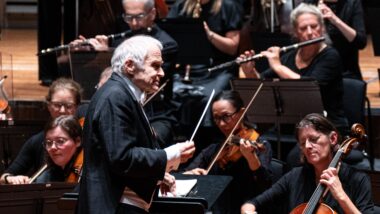 United Kingdom Bruckner: Orchestra of the Age of Enlightenment / Ádám Fischer (conductor). Queen Elizabeth Hall, London, 13.10.2024. (CK)
United Kingdom Bruckner: Orchestra of the Age of Enlightenment / Ádám Fischer (conductor). Queen Elizabeth Hall, London, 13.10.2024. (CK)

Bruckner – Symphony No.5
Is Bruckner falling out of favour? At the pre-concert discussion before the Orchestra of the Age of Enlightenment’s performance of the Fifth Symphony on Sunday evening a gentleman observed, rather sadly, that in 1996 – the centenary of Bruckner’s death – performances of his symphonies were everywhere: now, in the bicentenary of his birth, they are hard to find.
In this summer’s BBC Prom Guide there was a love-him-or-loathe-him face-off between two Radio 3 presenters – an attempt to stir up Bruckner controversy, an admission that unless we are dug in the ribs from time to time we are likely to forget him? Is he really such a Marmite composer? The Proms season featured three Bruckner symphonies, only one of them performed by a British orchestra. Wonderful performances imported from Berlin and Munich: but no sign of the late, great Seventh, Eighth or Ninth. I greatly approve of the Proms’ emphasis on diversity and originality rather than the automatic repetition of core repertory: but in London’s best hall for Bruckner one might have hoped for more.
Kudos to the OAE, then, for programming Bruckner’s (arguably) most challenging symphony, and for engaging Ádám Fischer to conduct it – a man esteemed throughout Europe and in America for his musical and humanitarian achievements, but who rarely appears in the UK; best known to collectors, perhaps, for his survey of the complete Haydn symphonies, recorded between 1987 and 2001 in the Esterházy Palace where most of them were written and first performed.
Asked for his views on period performance before the concert, Fischer gave a surprising answer: ‘Period-instrument performance is more for us than the audience: it is very important for the education of musicians.’ Less surprisingly, he said that the effect in Bruckner is to make the music sound lighter, more like Schubert. (It is an unimportant but nonetheless pleasing quirk of musical history that Schubert and Bruckner – 40 years apart – signed up for lessons in counterpoint from the same Viennese teacher, the long-lived and pedantic Simon Sechter.) ‘Our job’, Fischer concluded, ‘is to find Schubert in Bruckner, but also Wagner in Bruckner’.
Fischer is 75 (two years older than his brother Iván, founder and conductor of the Budapest Festival Orchestra), but he gave a young man’s performance of Bruckner 5: a lithe and dynamic figure on the podium, responding to every twist and turn of the music, every detail of its inner life, revealing it not as an edifice carved in marble but as an ever-developing organism, forever in motion until its final form is triumphantly achieved.
It was very exciting, and the musicians of the OAE responded magnificently, from the canopy of double basses along the back to the violins split left and right at the front, the woodwind now luminous, now pungent, the brass gloriously blended and organ-like. There was no lack of majesty where needed, but the dominant impression was of energy and forward movement: a single impulse, with variations of mood and tempo clearly accommodated within it. The hall’s lack of resonance was turned into a virtue – contrasts were dramatised, all Bruckner’s quirks and non-sequiturs in plain sight: Bruckner under a bright sun.
There were a few rough edges – unheard of in present-day Berlin or Munich, but common enough, I dare say, in Bruckner’s Vienna. A trumpet managed to slip in an extra note at the very end – an early entry for which he was good-humouredly joshed by his colleagues: we, of course, were too busy applauding to notice. And the brass players really did manage to save something for that minutes-long wall of sound with which the symphony ends.
A thrilling performance, a triumph for orchestra and conductor. I shall long remember Ádám Fischer windmilling away at the end of the Scherzo; and I will continue to hope that one of the London orchestras will book him to conduct Mahler.
Chris Kettle

About the Fischer brothers Ádám and Iván: their father Sándor was also a conductor, but also a composer. A highly gifted man, fortunately he survived the Holocaust and both of his children bring credit to him.
Chris Ketle’s review does justice to a marvellous performance. I was unsure how I would respond to Bruckner on ‘period’ instruments but I was completely won over. I hope for more Bruckner from the OAE.